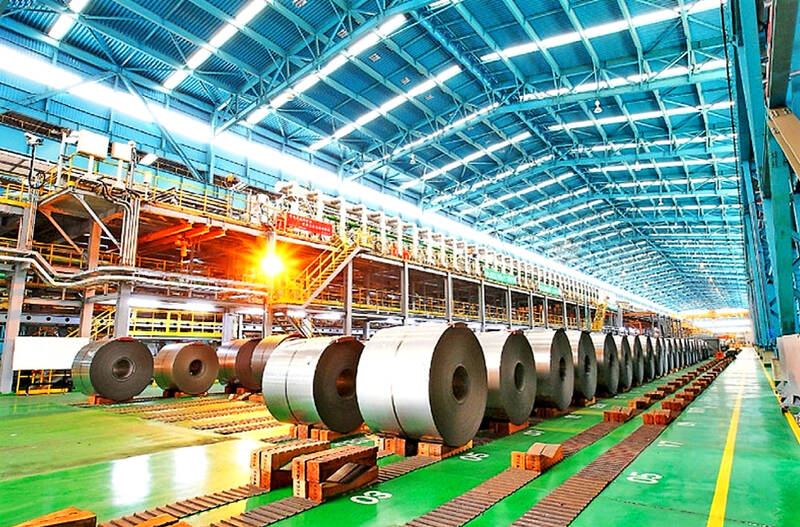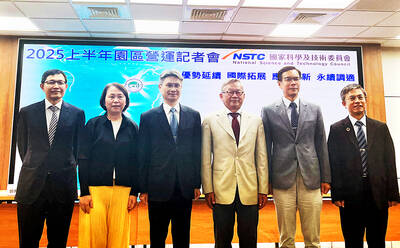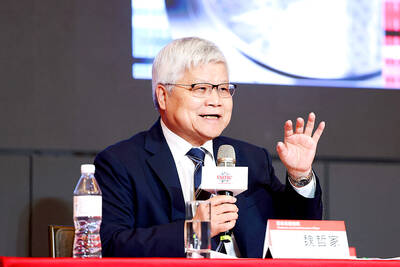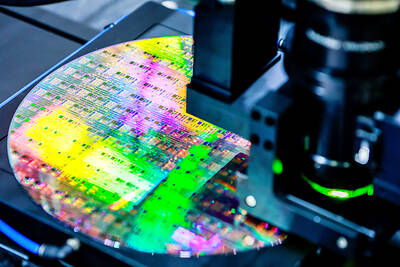China Steel Corp (中鋼), Taiwan’s biggest steelmaker, yesterday reported a fifth straight month of pre-tax losses as its offshore wind power subsidiary’s financial performance worsened and steel demand slumped.
Pre-tax losses ballooned to NT$1.29 billion (US$42.23 million) last month, compared with pre-tax losses of NT$840 million in July, the Kaohsiung-based company said in a statement.
In August last year, the company posted a pre-tax income of NT$240 million.

Photo courtesy of China Steel Corp
China Steel attributed the wider losses last month to a reduction in power generation by Zhong Neng Offshore Wind Farm (中能離岸風電), and lower non-operating income, mainly from a mining affiliate, whose operating costs rose, it said.
During the first eight months of the year, pre-tax losses amounted to NT$3.7 billion, compared with a pre-tax profit of NT$4.32 billion during the same period last year.
“Cumulative losses before income tax worsened from the same period last year mainly due to declines in steel sales and lower average selling prices, leading to revenue falls and higher operating losses,” the company said.
China Steel shipped 4.94 million tonnes of steel during the January-August period, down 5.18 percent from 5.21 million tonnes shipped a year earlier. Revenue shrank 12 percent year-on-year to NT$217.4 billion during the same period.
However, the company is quite positive about the outlook for next quarter, on the back of a seasonal pickup in steel demand and an improving macroeconomic environment.
Besides, destocking on the customer side is nearing an end, it said.
Demand for global commodity products is picking up, as businesses became less conservative about spending amid a respite in US tariff policy uncertainty and potentially key interest cuts by the US Federal Reserve by the end of this year, China Steel said.
On the supply side, global steel supply is stabilizing, as Beijing recently launched strict curbs on new steel output, it said, adding that it would help the global steel industry get back on track.
China is the world’s biggest steel producer.
Given the positive developments, China Steel raised price quotes for a second time for its major products for domestic deliveries this month and in the fourth quarter.

PULLING AHEAD: TSMC aims to start production at the Taichung fab in 2028 using its most advanced technology, while 1.6nm chips would be made in Kaohsiung next year Taiwan Semiconductor Manufacturing Co (TSMC, 台積電) is to start building a new 1.4-nanometer fab next quarter with an anticipated production value of up to NT$500 billion (US$16.49 billion), the Central Taiwan Science Park Bureau said yesterday. TSMC, the world’s biggest contract chipmaker, is working at full steam to push forward the construction of its new factories at home, rather than taking a slower approach as some media speculated, bureau Director-General Hsu Maw-shin (許茂新) said. “Everything is on schedule. TSMC plans to start construction in the fourth quarter. It is planning a detailed construction schedule and arranging contractors to build the fab,” Hsu

Taiwan Semiconductor Manufacturing Co (TSMC, 台積電) yesterday reiterated that the company has not entered discussions with any company about potential investments or partnerships amid ongoing rumors of ailing Intel Corp seeking TSMC’s participation. In a statement, TSMC, the world’s largest contract chipmaker, dismissed a report by the Wall Street Journal, saying that Intel had approached TSMC soliciting investment in Intel’s manufacturing operations or a partnership. The company said it has never entered into talks with any company on establishing a joint venture or engaging in the licensing or transfer of technology. That stance was similar to previous statements made by TSMC chairman C.C.

Taiwan has imposed restrictions on the export of chips to South Africa over national security concerns, taking the unusual step of using its dominance of chip markets to pressure a country that is closely allied with China. Taiwan requires preapproval for the bulk of chips sold to the African nation, the International Trade Administration said in a statement. The decision emerged after Pretoria tried to downgrade Taipei’s representative office and force its move to Johannesburg from Pretoria, the Ministry of Foreign Affairs has said. The move reflects Taiwan’s economic clout and a growing frustration with getting sidelined by Beijing in the diplomatic community. Taiwan

Samsung Electronics Co shares jumped 4.47 percent yesterday after reports it has won approval from Nvidia Corp for the use of advanced high-bandwidth memory (HBM) chips, which marks a breakthrough for the South Korean technology leader. The stock closed at 83,500 won in Seoul, the highest since July 31 last year. Yesterday’s gain comes after local media, including the Korea Economic Daily, reported that Samsung’s 12-layer HBM3E product recently passed Nvidia’s qualification tests. That clears the components for use in the artificial intelligence (AI) accelerators essential to the training of AI models from ChatGPT to DeepSeek (深度求索), and finally allows Samsung